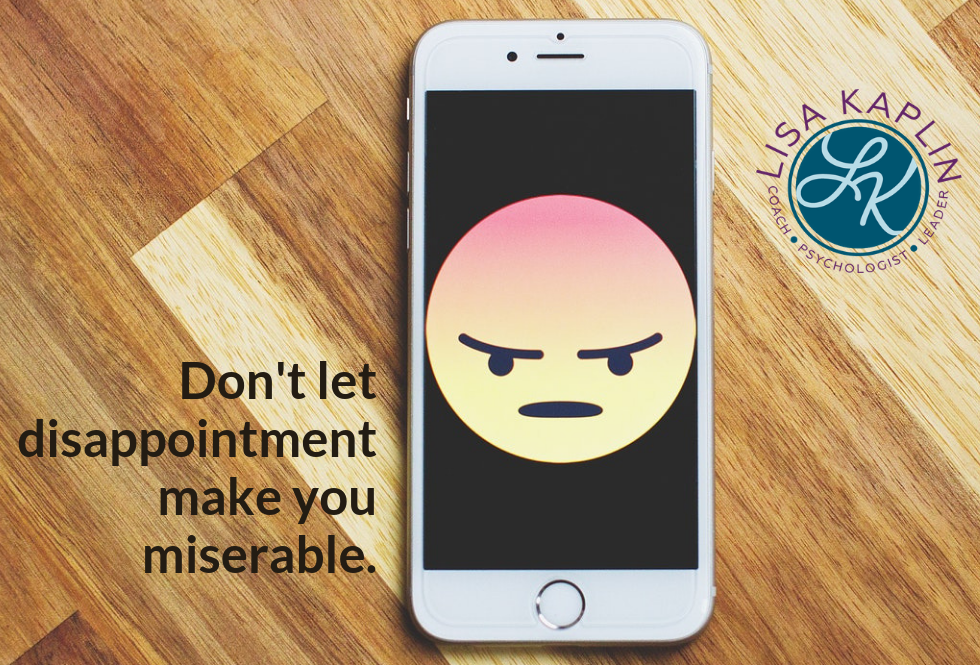Recently, I worked with a group of employees who were given some pretty disappointing news about their compensation and work contracts. Many of them had worked extremely hard to change their situation and ultimately, it didn’t work out. Fingers could be pointed at a variety of reasons for the letdown. However, the bottom line is that it was over and not likely to change for at least a few years.
My job was to come in and listen to these employees. I was to help them process their disappointment, anger, and feelings of rejection so that they could head back to work with less unhappy attitudes and a desire to continue performing at peak levels. I facilitated a number of sessions with these groups and as an outsider was fascinated by the diversity of responses. What I observed, and actually knew based on my education, was that how one handles disappointment is directly related to how they function in life and their level of contentment in life. *
This analysis isn’t a judgment of these employees in that any response they had was completely understandable based on the situation and their own life experiences. It is, however, meant as an awareness indicator. If we are aware of how we are handling disappointment, we can ultimately choose to handle it in the most effective way for ourselves and those around us. That awareness also allows us to choose to be miserable for shorter lengths of time and thus reduce our pain in the long run.
When we learn to handle disappointment with curiosity and an attitude of opportunity, we don’t suffer as much in the process because we don't view ourselves as a victim of circumstance. #disappointment #attitude #positivity Click To TweetWays of Processing Disappointment: The Good, The Bad, and The Ugly
Many of the people in the situation that I’m referencing felt as if they were victims. “No one here cares about us.” “We don’t matter.” “Why should I even bother. Nothing good happens to me.” They were discouraged and felt helpless and hopeless about the effect of their circumstances. This response was understandable, but certainly not helpful to their daily lives and happiness levels.
Others in the group were really, really angry. They pointed fingers at others. They refused to forgive and wouldn’t talk to many of their coworkers and leaders. They were agitated and judgmental. “How dare they do this to us?” was the common response of this group. Again, understandable, yet not a bit helpful. Some of these employees were likely to be fired if they kept this attitude up. They were exhausted and burnt out.
Another set of people were able to rationalize the situation and either tolerate it or make it okay in the short run. They often said, “Can we just stop talking about this and move on?” This group seemed to be feeling a bit better and appeared to be less dissatisfied with their situation than many of the others. I wasn’t sure if they had really addressed their own feelings, yet they were reporting more satisfaction at work.
One small group of people were concerned about their co-workers and friends. “I hope Susan in marketing is doing okay. I’m really worried about her.” They were compassionate and concerned about others and thus focused their energy in this way. They seemed more content than the other groups and were moving on more quickly at work.
The last group looked at the whole situation as a fascinating opportunity. They were curious and open to lessons learned and information gathered. They said, “I met a bunch of people that I wouldn’t have met otherwise. I learned about what others do here and I’m interested to see how we can grow because of the challenging experience that we had.” These people presented as calm and interested in chatting, but not at pointing fingers or feeling victimized. They saw a win for everyone in that information was gathered and relationships had developed that might not have otherwise.
Here’s the thing…we all handle disappointment in different ways. When we learn to handle it with curiosity and with an attitude of opportunity, we don’t suffer much in the process. In fact, we are likely to see the world as a very different place from the world in which we see ourselves as an effect of the circumstances. Is it always easy to handle things this way? Nope! It takes work and awareness, but ultimately that awareness pays off in our satisfaction and happiness in life. So ask yourself, how you handle disappointment and how do you decide if it’s in your best interest to keep responding in that way?
Love,

Lisa Kaplin Psy. D. PCC
*This analysis is based on the Energy Leadership Index developed by Bruce D. Schneider of iPEC Coaching.

